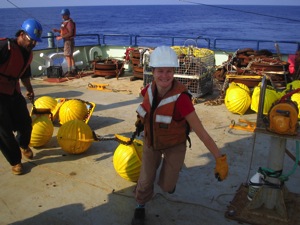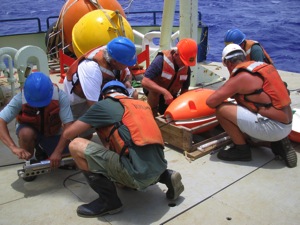| Instructor: |
Lisa Beal |
| Time: |
Tuesday & Thursday
10:30 am - 11:45 am |
| Location: |
MSC 343 |
Course Overview
Application of the laws of physics to the study of the properties and circulation of the world’s oceans. Physical description of the sea; physical properties of sea water; forcing and the equations of motion; boundary processes; waves; thermohaline circulation; variability; instrumentation and observation.
Prerequisites: the mathematics and physics required for admission to the graduate curriculum at the Rosenstiel School, or consent of the instructor. It will be assumed that you know Newton’s 3 Laws, linear and angular momentum conservation, derivatives and partial derivatives, integrals, scalars and vectors, gradient, divergence, and curl.
Course requirements: Two graded exams, midterm (25%) and final (45%); One report/project with presentation and written requirements (30%). Study questions are provided weekly and solutions led and discussed by YOU during class. Click here for details of the project
Recommended Books
- Introduction to Physical Oceanography by Robert Stewart (RS). This is an online text, which includes a printable PDF and cover. The PDF version is September 2008. The HTML version has some errors (information from R. Stewart), but may be updated more often.
- Descriptive Physical Oceanography: An Introduction by Lynne Talley et al. (LT). New text in 2014. On reserve at the Rosenstiel School library.
- Introduction to Physical Oceanography by John Knauss (JK). On reserve in library and stocked at UM bookshop.
Other Books and Further Reading
- Introductory Dynamical Oceanography by Pond and Pickard (referred to as PP in notes).
- Ocean Circulation by Open University team (OU)
- Atmosphere-Ocean Dynamics by Adrian Gill.
Course Outline
Note: Links will be made available and/or updated as lectures are given.
| Lectures |
Descriptions |
| Lecture 1 |
Introduction - Course Overview |
| Lecture 2 |
Geography of the world’s oceans and major current systems (RS3) |
| Lecture 3 |
Physical properties of seawater I - Temperature, Salinity and Pressure (RS6,JK2,PP2) |
| Lecture 4 |
Physical properties of seawater II - potential temperature, density, potential density, static stability (JK2,PP5) |
| Lecture 5 |
Property distributions - water masses and tracers (JK8,RS6) |
| Lecture 6 |
Forcing of the Ocean: Tides, winds, and heating (RS4-5 &17,JK3,OU1-2) |
| Lecture 7 |
Mass, energy, and salt conservation: continuity equation (PP4,JK4,OU6,PP10) |
| Lecture 8 |
Equations of Motion on a rotating planet - Coriolis force and inertial oscillations (JK5,PP6,OU3) |
| Lecture 9 |
Basin budgets and two-layer exchange flows (JK11) |
| Lecture 10 |
Scaling: relative importance of the terms in the Equations of Motion (PP7) |
| Lecture 11 |
Ekman Layers and the Ekman Spiral (PP9,JK5-6,OU3,RS9) |
| Lecture 12 |
Geostrophy: Dynamic Method and Thermal Wind (RS10,PP8,JK6,OU3) |
| Lecture 13 |
Potential vorticity equation - concept of curl/spin/vorticity (PP9,JK5,RS12) |
| Lecture 14 |
The Sverdrup balance and gyre circulation (RS11,PP9,JK6) |
| Lecture 15 |
Western Intensification (RS11,PP9,OU4) |
| Lecture 16 |
The Agulhas Current as a case study of a Western Boundary Current |
| Lecture 17 |
Upwelling - equatorial, coastal, and Antarctic (OU5,JK7,RS14) |
| Lecture 18 |
Wind-generated waves (PP12,JK9) |
| Lecture 19 |
Eddies and planetary waves (PP12,JK10,OU5) |
| Lecture 20 |
Water mass formation and mixing (RS13,PP10) |
| Lecture 21 |
Abyssal circulation (RS13,PP10,OU6) |
| Lecture 22 |
Thermohaline circulation and heat transport (RS13,OU6) |
| Lecture 23 |
Instrumentation and Experimentation |
Lecture 1: Introduction - Course Overview
Lecture 2: Geography of the world’s oceans and major current systems (RS3)
Lecture 3: Physical properties of seawater I - Temperature, Salinity and Pressure (RS6,JK2,PP2)
Lecture 4: Physical properties of seawater II - potential temperature, density, potential density, static stability (JK2,PP5)
Lecture 5: Property distributions - water masses and tracers (JK8,RS6)
Lecture 6:Forcing of the Ocean: Tides, winds, and heating (RS4-5 &17,JK3,OU1-2)
Lecture 7:Mass, energy, and salt conservation: continuity equation (PP4,JK4,OU6,PP10)
Lecture 8:Equations of Motion on a rotating planet - Coriolis force and inertial oscillations (JK5,PP6,OU3)
Lecture 9:Basin budgets and two-layer exchange flows (JK11)
Lecture 10:Scaling: relative importance of the terms in the Equations of Motion (PP7)
Lecture 11:Ekman Layers and the Ekman Spiral (PP9,JK5-6,OU3,RS9)
Lecture 12:Geostrophy: Dynamic Method and Thermal Wind (RS10,PP8,JK6,OU3)





